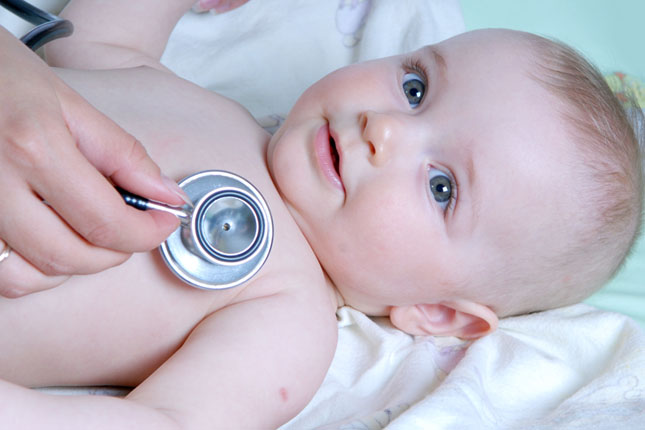Parent Savers
Coping with Your Child's Serious Diagnosis
Please be advised, this transcription was performed from a company independent of New Mommy Media, LLC. As such, translation was required which may alter the accuracy of the transcription.
[00:00:00]
[Theme Music]
Johner Riehl : When a child is diagnosed with an illness, they're thrust in an adult world of doctors appointments, blood tests, x-rays and injections. At the same time, parents' lives change forever as they face the practical and emotional consequence of a life changing diagnosis. How can we help kids deal with their new realities and how can we as parents make the best of this situation? Today we're talking all about how to face a serious diagnosis, and this is Parent Savers, episode 65.
[Theme Music/Intro]
Johner Riehl : Welcome back everybody to Parent Savers, broadcasting from the Birth Education Center of San Diego. Parent Savers is your weekly online on the go support group for parents of newborns, infants and toddlers. I'm your host, Johner Riehl, and thanks again for all of our loyal listeners who joined the Parent Savers Club. Our members get all of our archived episodes, bonus content after each new show, where we do a special conversation with our expert, extending the show. And plus, we also have special giveaways and discounts that we offer to our members. You can subscribe to our monthly newsletter for free though, if you're not already a member, and you can get a chance to win a membership to our club each month. Another way for you to stay connected is by downloading our free Parent Savers app, available on the Android and iTunes market place, or you can just stay connected with us on Facebook and Twitter, and not only will you know when new episodes come up, but we engage on some different topics throughout the week, and we also offer you a chance to interact with the shows, via producer Aaron, in the studio, using our Facebook page or a Twitter, as we're recording the show live, you can ask questions to our experts as well. Today we're joined in the studio by a group of parent panelists to discuss our topic on how to face a serious diagnosis, so let's go around the room and let everyone know is here.
Scott Kilian : I'm Scott Kilian and I'm 36 years-old, I'm a certified financial planner, I've got one boy, Alex, who is 3.
Molly Riffel : I'm Molly Riffel, I'm 32, I'm a teacher/stay at home mom, and I have two little girls, Abigail, who is 2 and a half, and Riley, who is 3 months.
Johner Riehl : And I'm your host, Johner, and we have three boys. Six, four and two years-old. How about you Dr. DeLand?
Maitland DeLand : I have two children, I have a daughter who is 25, and she is a fourth year medical student, and my son is 21, and he's a fourth year history major.
Johner Riehl : Nice, that's great! Welcome to the show and thanks everyone for joining us.
[Theme Music] [Featured Segments: Ask the Experts]
Johner Riehl : Here's a question from Mellisa, “I just had my daughter four days ago and I'm already feeling depressed and it's not baby blues, it's way worse. I had this happen with my last pregnancy and I didn't do anything about it, mostly because I didn't want to take something to make me feel normal. It feels way worse this time and I'm better talking about it with my husband, but is this something I should bring up with my OB at my six week appointment? Any recommendations on how to not feel like this?”
Yvonne Rothermel : Hi, this is Yvonne Rothermel, licensed clinical social worker. Hi Mellisa! I'm so glad you wrote in and you're seeking support this time around. I'm also glad you are talking about how you are feeling with your husband. It is so important to let trusted others know how you are really doing. It is important for you to know that you do not have to suffer through this, this time around. There are very effective treatments for postpartum depression. Depending on the severity of your symptoms, medications may be recommended, but medications are not the only treatment for postpartum depression. It's also important for you to know that you are not alone, many women experience postpartum depression. This is not your fault, it's not some weakness in you that you get this and others do not. If you're having depressive symptoms, I would not wait for your six weeks appointment with your OB/GYN, I would call your doctor right away and let him or her know that you're feeling depressed. It's important not to wait to seek help, because we know that the sooner you seek treatment support, the better outcomes for both mom and baby. I would also contact postpartum support international, to find out if there are therapist and psychologists in your area that specialize in postpartum depression. It's important that you get a full assessment from a health professional specializing in this area, that way you ensure proper treatment plans. You can find them on the web at www.postpartum.net. I would also recommend the blog Postpartum Progress, at www.postpartumprogress.com. It is one of the most widely read, best blog on the postpartum disorders, and it works to empower women in their recovery. You have asked for recommendations to feel better, beyond the assessment which we talked about, I would work to reduce your expectations of yourself right now. Your health is more important than a clean house or dirty laundry. Optimize your time with support of others, allow others to do for you, ask for help from your partner so you can take breaks and get sleep. So many women have such a difficult time asking for help, but it's just necessary. Try to get out of the house and take walks when you can, find a support group through postpartum support international, to reduce your risk of isolation. Most of all, be gentle with yourself, and know that women do recover from postpartum depression and feel better. I'm glad you wrote in.
[Theme Music]
Johner Riehl : Today's topic is how to face a serious diagnosis, Dr. DeLand is a radiation oncologist and an author, and she's going to help tell us about ways to help families and kids who are facing a serious diagnosis. So, Dr. DeLand, can you tell us a little about your experience, both personally and professionally in seeing kids face serious problems?
Maitland DeLand : Yes, in fact I am in a unique position, because I have sort of been on both sides, I have been a parent, because my daughter has serious allergies and still does has asthma. When she was a baby she was in the hospital with pneumonia. And my son was diagnosed with diabetes when he was four, and then developed epilepsy and has a couple other issues. So, for me, I've been on that side where the doctor says something to you and you just don't want to hear it. So I think that really helped me as a physician, what I usually do and what I pride myself in doing is engaging the child. Getting the child comfortable and of course talking to the parents, but the most important thing is to be able to get the trust of the child. The child is going to need to cooperate for all kinds of tests, and so I think that when a child feels a little empowered in some way, it does help.
Johner Riehl : You mentioned that your son was 4, I believe, when he was diagnosed with diabetes. How important was it, as a parent, or in your opinion as a doctor, for him to really understand that diagnosis at that age? Is it more important that he just would have a repour or is it important that a kid as young as 3 or 4 understands, or how much do they need to understand?
Maitland DeLand : Between 3 and 4, it depends. Whenever I had to sedate a child for a treatment, typically, I always had to sedate 3 and younger for radion treatment. Four year olds sometimes, and part of that is understanding. So for my son, my experience was not good. For Andrew I basically talked to him about any time he was eating he had to take this shot, and gradually he participated and understood all of that, but you sort of have to do it at the child's pace, and you can't do everything at once, because it's overwhelming. It's overwhelming for the adult.
Johner Riehl : Molly, I know you had some experience as well back when your baby was in utero, when Riley was in utero, can you talk to us a little about what you went through?
Molly Riffel : Yeah, at 20 weeks gestation I found out that Riley had a heart condition, we were doing our 20 week checkup, and we were looking in-depth at the heart and gave us the news that something was wrong with the heart, and he did it over the phone, told me to come in. My husband was out with the 2 year-old, he went in and they said, “Your daughter has a congenital heart defect, instead of having four chambers in her heart she only has two”. And when she is born, the oxygenated and un-oxygenated blood will mix, so she'll have to have open heart surgery by the time she is six months old. And along with that, she also has down syndrome. So at 20 weeks gestation they said if you wish, we can terminate the pregnancy, and my husband and I said absolutely not, she's going to have heart surgery and she'll be fine. At 20 weeks, we were able to get a lot of information, we still had the pregnancy to go, so we did lots of research, lots of online Internet looking, some of it was good, some of it wasn't. Finding out that it's OK, what she has is not life threatening, as long as she goes through with the surgery well. Luckly, we are in San Diego, where they have a great team of doctors at children hospitals that can do the surgery, and they've done it thousands of times. But that was one of the scariest things I've ever had to hear, “Your baby has a heart condition”. I've never had surgery, and she was going to have it at 6 months.
Johner Riehl : And this is your first?
Molly Riffel : This is my second. I have a 2 year-old at home. The day we found out, my husband and I we were sitting in the car just crying, sobbing, and our daughter, she was 18 months, so she is in the back of the car and she's telling us to calm down, “Mommy, daddy, calm down”, so she was telling us to do that, 'cause she new something was wrong. She understood that something is wrong, and we kept telling her that it's OK, and she goes, “Baby no, baby no”, because she knew something was wrong. But it was definitely a scary, scary news. It took weeks for us to get over, to be able to tell our families that something was wrong with the baby.
Johner Riehl : So you didn't share the news?
Molly Riffel : We shared it with my mom and my dad right away, but I couldn't do it yet with everybody else. To tell my parents it took like an hour, because we just cried the entire time we were trying to tell them that our baby has a heart problem and she is going to have to go to surgery.
Johner Riehl : Did she have the surgery yet?
Molly Riffel : Not yet, she'll have it in September. She was in the hospital for 79 days, because she was born prematurely. With her heart condition, she has a hard time eating, so she stopped eating out of a bottle, couldn't nurse, couldn't do anything, so she had to have surgery to put in a G-tube, which is a feeding tube that goes right into her belly. And she was just over 2 months old when she had that surgery. And then right before her 3 months birthday, we came home for the hospital. So we've only been home for like three weeks.
Maitland DeLand : Oh my Goodness!
Molly Riffel : Yeah. So she has had lots of complications along the way, she has gone into heart failure already, once. So she's on three different heart meds, they call it “cocktail”, to keep her heart strong, 'cause she is very weak, no energy, she cries very little, she is very quiet.
Maitland DeLand : Well, you know, in the past, and it is common for a down syndrome child to have cardiac abnormalities. It used to be the main cause of fatality for the child, so they made great steps ahead with the cardiac surgery, and are able to do so much for these children now. I'm going to pray for you, my heart goes out to you, because everybody wants and everyone expects their child to be healthy.
Molly Riffel : Yeah, that was one of the hardest things, getting the news and then realizing that our child's not going to be that healthy child like the 2 year-old. She is not going to be able to run around. She will eventually, but she is not going to be like the 2 year-old. It was a hard thing to accept.
Johner Riehl : Let's talk about that a little bit more after the break, about the perspective of parents and other kids, dealing with the siblings and how you're processing your emotions. You said you over it, but I wonder what that really means, so let's talk about that a little bit more after the break.
[Theme Music]
[00:13:04]
Johner Riehl : Welcome back everyone, today we're talking about when your family has to face a serious diagnosis, with Dr. Maitland DeLand, who is on the phone with us, and Molly is in the studio with us as well, with her daughter Riley, who has to have a heart surgery. And Scott is here as well. You talked a lot Molly about how you were crying a lot, and even talking about it now brings tears to your eyes, but what tips do you have now that this is your reality for the last few months, about how parents process their emotions, come to terms with what's going on, deal with it, make sure that their emotions aren't affecting the siblings. Maybe you might have some ideas, or maybe Dr. Maitland too, about the kids, if they're old enough to understand the diagnosis.
Molly Riffel : For me, the best thing was to learn about it. To learn about both diagnosis, the down syndrome and the heart condition, because I knew nothing about either. For me, being a teacher, education was huge. I did lots of research. And then, eventually, talking about it was the biggest thing. Talking to everybody about what she's going to have, and that helped me understand that it's no big deal, she'll be fine, she's going to be OK, she is going to be a little different, but she'll be great. So for me talking was huge.
Johner Riehl : Do you find that maybe talking to other people you get feedback or inspiration from surprising places that you weren't expecting?
Molly Riffel : Yeah, we became a part of the Down Syndrome Association here in San Diego fairly quickly after finding out about this, and talked to many many parents who have kids with down syndrome, and learning about the struggles they go through, but also the positive parts of having kids with down syndrome, realizing that this is isn't a life ending diagnosis, it's just a different path than what we planed. For us, that was the biggest help, for my husband and I, to talk to the people who've gone through this. And then, as far as our daughter, Abigail, just explaining to her that Riley was sick, and when she's born she' going to need lots of help, making her to understand that she'll be fine. The hardest part for Abigail was being in the hospital for 2 and a half months. Because one of us, my husband and I, was only in the hospital with Riley, and the other was at home, so we were split up as a family. So for her, understanding that Riley is sick, Riley needs help, Riley needs doctors and the hospital and mommy and daddy. So we talked to her a lot and explained that to her.
Johner Riehl : At some point, they become part of her routine, and it became normal for her.
Molly Riffel : Yes, and then once we came home again she was looking around not knowing why everyone was there, after two and a half months.
Scott Kilian : Did you and your husband have a chance to talk before about what if? I mean, I'm sure the phonecall was a surprise, but before that, and I know that with Andrea and I, when she decided to and amnio, we talked about if the results are bad, what are we going to do? That's a hard conversation to have, 'cause you don't know, and you don't know when you're going to get the results. Did you guys talk before that, or was this more like a shock to the system, and now we have something that we have to really address and come together as a family to do it?
Molly Riffel : We've been there for so long, we have had the conversation over years, that if we ever had something wrong with our kids, we are going to have the babies, no matter what. Unless it was something that would severely harm me, or cause me problems if we were going to have the baby. So we knew that we were going to have the child, no matter what. With our first one, it took us a year and a half to get pregnant, so for us to even think about ending the pregnancy, just because she's got a few problems, we just couldn't. When the doctor asked us if we want to end it, my husband instantly replied no. And then we thought about doing the amnio, they encouraged us to do an amnio, and we didn't want to, because it can increase your chance to having a miscarriage. I don't like needles, so I didn't want that needle near me, so we actually did a blood test. They can do a blood test now to find the baby's DNA and they were able to find out her gender, and then also for sure that she had the down syndrome, prior having her. So we didn't have to do the amnio, but it was one of those things where we knew that something was wrong with her, we didn't want to do the amnio, and we were fine with it, because she was going to be born, we were going to conquer whatever came towards us. But it was something we knew ahead of time that we were not going to end it.
Johner Riehl : Dr. Maitland, what do you see when you're delivering news to parents and siblings and their reactions and how they deal with things?
Maitland DeLand : I think that one of the important things that I try to tell them is to not make the child's brother or sister feel like they have to babysit them, because you don't want to feel like it's a burden for them. Sometimes they think you're spending to much time with this child, and they feel let down. So I try to tell them that everybody helps, because the last thing you want to do is make that child feel that he is a burden. So that's really important, and then I always just say, everybody has something, you're going to have to get shots, but these are things to watch out for. Just like you would if he fell down, you know, if you fell down, you tell mommy. But you never want to make one child feel like he is responsible for the other child. And not to talk about really serious things right in front of them, because they hear more than you know so they understand what's going on, but then the sibling also needs to understand but also needs to have a fun time, and not feel like they're tied down.
Molly Riffel : That's what we're trying to do with our 2 year-old, encourage her to have family time, everybody is doing something, the other day I took my 2 year-old out just to play and then my husband has to do that, so she doesn't feel like we can't do anything because Riley is here. We wouldn't want her to have animosity towards Riley because something is wrong with Riley. We don't want her to see Riley as something bad, we want her to see her as something fun.
Maitland DeLand : You spend more time with Riley than me, so you are doing the right thing, and I've seen it not done that way, I know that it's very harmful for the child.
Johner Riehl : I want to talk a little more about the impact on parents, I imagine you and your husband were in a good spot before. Has it solidified your relationship, or you had moments when it's been really hard?
Molly Riffel : I think what's been really hard was not being together, because we were in different spots. We would literally pass each other on the entry way to the hospital, 'cause our 2 year-old would sleep in the car, passed each other, give a kiss, say bye, and then talk on the phone. We celebrated her anniversary and we were on the phone, because we couldn't see each other.
Johner Riehl : So let's that it tears a couple apart, it's tragic to hear about the parents divorcing, but I think that the real bad stuff is that they're arguing about it and bringing it into the room, there has to be some agreement that, “we got to pull it together”, for the kid.
Molly Riffel : That's what we tried to do with our 2 year-old, not arguing in front of her, not having these conversations about Riley in front of her, just that she understands that Riley is a good thing, we just made a point to not be negative in front of her, because she has seen us fight over some things with Riley and she just looses it, she hates it, every time we start to cry she always gets upset, so we make a point to be as strong as possible in front of her. She does see emotions, but nothing severe, nothing extreme.
Johner Riehl : Dr. Maitland, I know that in your books you do talk about asthma and diabetes and epilepsy and cancer, I was wondering if you could maybe offer a tip, one of the tips that you have in the books or some of the things that it's good for parents or families to know about getting a diagnosis with each of those.
Maitland DeLand : Well, I think one of the biggest tips I can give is just to be honest. I think kids understand more than you think, and I think don't tell the truth, or people have different opinions – I think everybody needs to be on the same page, and say the same thing. I went to visit my son in Houston once and this little girl came out of the room, and she turned to her mother and she said, “I thought you said it was a test! You told me it was a test, I thought they were going to ask me if I like sugar, if I eat candy!”, and it was a blood test. And so I think you have to tell the truth, because you lose credibility and then everyone needs to be on the same page, otherwise it is very confusing. When one person says one thing and somebody else says differently...
Johner Riehl : But then there is a line too though between knowing how much truth they need...
Maitland DeLand : Absolutely, and that depends frankly on the child.
Johner Riehl : You say that generally speaking kids end up facing it with more confidence than adults do?
Maitland DeLand : Yes. I think so, I think parents go through a period of time when they are very angry, and say, “How could God do this to my child? He is an innocent child, how could this happen?”, and that's such a difficult question to answer, but I always tell people that we weren't here when God created Heaven and Earth, and we don't know what he's path is, for each of us, but we have to put our trust in that, because it's a very difficult thing when you have an innocent child that's subjected to an illness, it's just a very very difficult thing. And then children, I think that that's one of the most saddest things that I ever heard, I had this little girl and she had cancer, and she was talking to me one day, and she knew she was going to die. She was about 11, and she said, “Dr. Maitland, I don't mind if I'm going to die, that's OK, I just don't want to be cold”, and so I talked to her and I told her that she wouldn't be cold at all. I couldn't believe she said that, she must have heard something at home about death or something like that, somebody must have said that she has cancer and she must have heard that she was going to die.
Johner Riehl : It's sad to think about it, but in a way it's comfortable to know that kids can be so resilient, accepting, and that we can probably learn a little bit from them.
Maitland DeLand : You always can.
Johner Riehl : Alright, well baby Riley, thanks for sticking with us for all that time, and thank you Dr. DeLand.
Maitland DeLand : You're welcome!
Johner Riehl : I hope you folks found this useful, we're actually going to talk more for our bonus segment, Dr. DeLand will tell us a little bit more about her books, so stick around for that for our Parent Savers Club members. For more information on today's show, information on any of our panelists, please visit the episode page on ParentSavers.com, we're going to do a quick break and then we'll wrap up the show.
[Theme Music] [Featured Segments: The Emotional Side of Parenting]
[00:24:54]
Johner Riehl : Before we wrap things up, here's psychologists Jennifer Schere, on some timps to surviving the emotional side of parenting.
Jennifer Schere : Hi Parent Savers! I'm Dr. Jennifer Schere, a clinical psychologists with a practice in San Diego. A large focus of my work is on helping women during pregnancy and throughout the transition to motherhood. Today's topic is strategies for redefining boundaries with your own mom, and other family members, once you have a baby. An important thing to consider when becoming a new mother, is what you want from your own mom, and then doing the big girl job of communicating that. Some women want their mother's support during delivery, or right after bringing baby home. Other women want the birth experience to be shared with spouses only, and feel strongly about having private bonding time. It is helpful to think through your needs and to communicate this ahead of time to family members. This allows time for feelings to get sorted out, and expectations to become clear to everyone. Many of us have mothers and relatives that are all to eager to jump in and voice their opinions, however, when we are vulnerable and unsure of ourselves, we often want reassurance and validation. It is normal to feel sensitive or criticized by others' instructions on how some things should be done. New grandmas are adjusting too, they may become overinvolved due to a desire to feel close and maintain purpose in the new family constellation. Everyone is going through loss at the very time that everyone is gaining. As a new mom, it can be helpful to think of yourself as CEO of your family. Use your relational intelligence to put the right personalities in the right roles. If mom or an aunt is good at doing it, let her stop the fridge and manage the baby supply list. Perhaps you can do research on baby nutrition or pediatricians. Put your people to work in ways that they can feel meaningful too. But know that you make the final decisions, and allow your intuition to guide you. It is part of forging your own path into finding your maternal authority. Thanks for listening to today's segment, and keep listening for more episodes on how to thrive as a new parent.
[Theme Music]
Johner Riehl : That wraps things up for today, thanks so much for listening to Parent Savers. Thank you so much baby Riley, she is adorable! We appreciate you listening to Parent Savers, don't forget to check out our sister shows, Preggi Palls for expecting parents, and our show the Boob Group for moms who breastfeed their babies. Next week we're going to be talking to Dr. Scott Koenig, about dealing with power struggles. This is Parent Savers, empowering new parents!
[Disclaimer]
This has been a New Mommy Media production. Information and material contained in this episode are presented for educational purposes only. Statements and opinions expressed in this episode are not necessarily those of New Mommy Media and should not be considered facts. Though information in which areas are related to be accurate, it is not intended to replace or substitute for professional, Medical or advisor care and should not be used for diagnosing or treating health care problem or disease or prescribing any medications. If you have questions or concerns regarding your physical or mental health or the health of your baby, please seek assistance from a qualified health care provider.
[00:28:11]
[End Of Audio]











